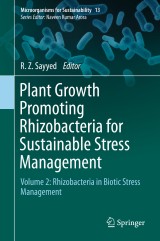Details

Plant Growth Promoting Rhizobacteria for Sustainable Stress Management
Volume 2: Rhizobacteria in Biotic Stress ManagementMicroorganisms for Sustainability, Band 13
|
CHF 177.00 |
|
| Verlag: | Springer |
| Format: | |
| Veröffentl.: | 11.10.2019 |
| ISBN/EAN: | 9789811369865 |
| Sprache: | englisch |
Dieses eBook enthält ein Wasserzeichen.
Beschreibungen
<div><p>Attaining sustainable agricultural production while preserving environmental quality, agro-ecosystem functions and biodiversity represents a major challenge for current agricultural practices; further, the traditional use of chemical inputs (fertilizers, pesticides, nutrients etc.) poses serious threats to crop productivity, soil fertility and the nutritional value of farm produce. Given these risks, managing pests and diseases, maintaining agro-ecosystem health, and avoiding health issues for humans and animals have now become key priorities. The use of PGPR as biofertilizers, plant growth promoters, biopesticides, and soil and plant health managers has attracted considerable attention among researchers, agriculturists, farmers, policymakers and consumers alike.</p>
Using PGPR as bioinoculants can help meet the expected demand for global agricultural productivity to feed the world’s booming population, which is predicted to reach roughly 9 billion by 2050. However, to provideeffective bioinoculants, PGPR strains must be safe for the environment, offer considerable plant growth promotion and biocontrol potential, be compatible with useful soil rhizobacteria, and be able to withstand various biotic and abiotic stresses. Accordingly, the book also highlights the need for better strains of PGPR to complement increasing agro-productivity.<p></p><br></div>
Using PGPR as bioinoculants can help meet the expected demand for global agricultural productivity to feed the world’s booming population, which is predicted to reach roughly 9 billion by 2050. However, to provideeffective bioinoculants, PGPR strains must be safe for the environment, offer considerable plant growth promotion and biocontrol potential, be compatible with useful soil rhizobacteria, and be able to withstand various biotic and abiotic stresses. Accordingly, the book also highlights the need for better strains of PGPR to complement increasing agro-productivity.<p></p><br></div>
Chapter 1. Biosynthesis of Antibiotics by PGPR and its Role in Biocontrol of Plant Diseases.- Chapter 2. Effect of Substrates on <i>Azotobacter chroococcum</i> Enriched Vermicompost for Growth of <i>Phaseolus.- </i>Chapter 3. PGPR in Biotic Stress Management of Fungal Diseases.- Chapter 4. Management of Plant Diseases by PGPR-Mediated Induction Resistance.- Chapter 5. Amelioration of Biotic Stress by Application of Rhizobacteria for Agriculture Sustainability.- Chapter 6. Role of <i>Serratia</i> spp. as Biocontrol Agents and Plant Growth Stimulator With Respects of Biotic Stress Management In Plant. Chapter 7. Seed Biopriming Through Beneficial Rhizobacteria For Mitigating Soil and Seedborne Diseases.- Chapter 8. Zinc Solubilizing Bacteria: A Boon for Sustainable Agriculture.- Chapter 9. Plant Small RNAs: Big Players in Biotic Stress Responses.- Chapter 10. Interaction of Rhizobacteria with beneficiary Microorganisms :A Agrobeneficiary Aspect.- Chapter 11. Role of Indigenous Technology knowledge in Biological Control of Crop Diseases Under Organic Agriculture In India: An Overview.- Chapter 12. PGPR’s – Effective Managers of Biotic Stress.- Chapter 13. Biotic and Abiotic Stress Management by AM-Mediated PGPR.- Chapter 14. Plant Growth Promoting Rhizobacteria: An Overview In Agricultural Perspectives.- Chapter 15. Impact of Acinobacteria on Agriculture.<p></p> <br><p></p><p></p><p></p><p></p><p></p><p></p><p></p><p></p><p></p> <br>
<div><div><b>Riyaz Z Sayyed</b> is an Associate Professor and Head of the Department of Microbiology, PSGVP Mandal’s Arts, Science College, Shahada, Maharashtra, India. Currently, he serves as President of the Indian Chapter of the Asian PGPR Society for Sustainable Agriculture. He has 15 years of research expertise in siderophore based PGPR and has authored 91 peer-reviewed research papers and 64 books. He is a recipient of many prestigious awards and honors from various research societies and the Government of India. In addition, he is an Associate Editor of the journal Environmental Sustainability (Springer).</div><div><br></div><div><br></div></div>
<p>Attaining sustainable agricultural production while preserving environmental quality, agro-ecosystem functions and biodiversity represents a major challenge for current agricultural practices; further, the traditional use of chemical inputs (fertilizers, pesticides, nutrients etc.) poses serious threats to crop productivity, soil fertility and the nutritional value of farm produce. Given these risks, managing pests and diseases, maintaining agro-ecosystem health, and avoiding health issues for humans and animals have now become key priorities. The use of PGPR as biofertilizers, plant growth promoters, biopesticides, and soil and plant health managers has attracted considerable attention among researchers, agriculturists, farmers, policymakers and consumers alike.</p><p>Using PGPR as bioinoculants can help meet the expected demand for global agricultural productivity to feed the world’s booming population, which is predicted to reach roughly 9 billion by 2050. However, to provide effective bioinoculants, PGPR strains must be safe for the environment, offer considerable plant growth promotion and biocontrol potential, be compatible with useful soil rhizobacteria, and be able to withstand various biotic and abiotic stresses. Accordingly, the book also highlights the need for better strains of PGPR to complement increasing agro-productivity.</p><p></p>
Presents PGPR-mediated agriculture as the most widely accepted practice for a growing number of crops and managed ecosystems, and as a safe means of pest control Explains biocontrol as an underestimated and therefore underused approach Provides valuable insights into the new tools of recombinant DNA technology, mathematical modeling and computer technology in combination with more traditional approaches such as importation and release of natural enemies and improved germplasm, breeding and field testing
Diese Produkte könnten Sie auch interessieren:

Handbook of Poisonous and Injurious Plants

von: Lewis S. Nelson, L.R. Goldfrank, Andrew Weil, Richard D. Shih, Michael J. Balick

CHF 142.00















